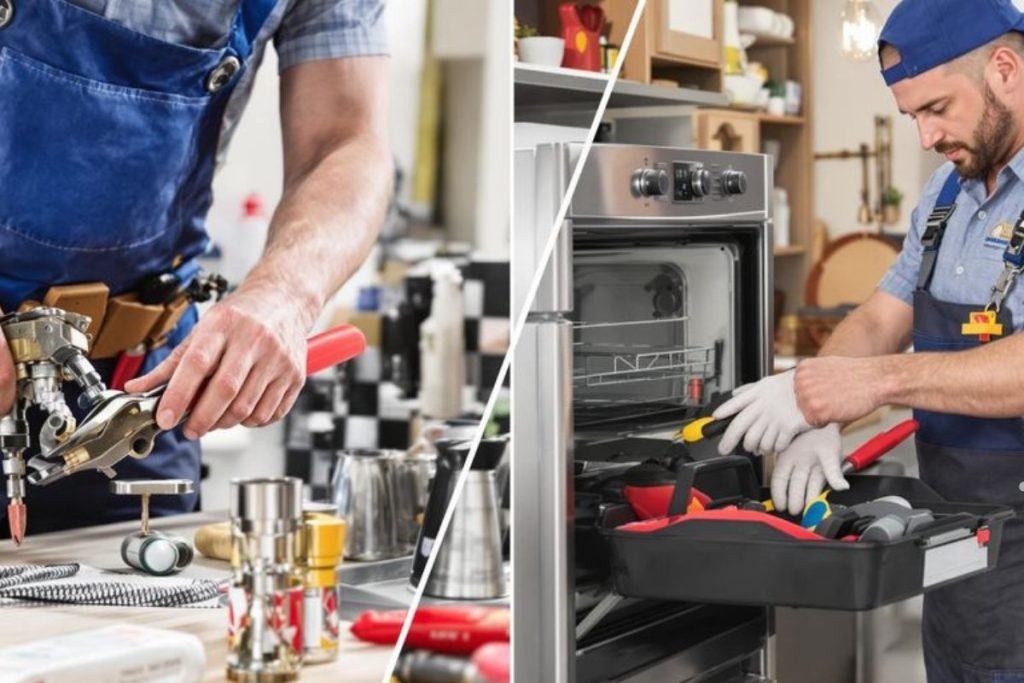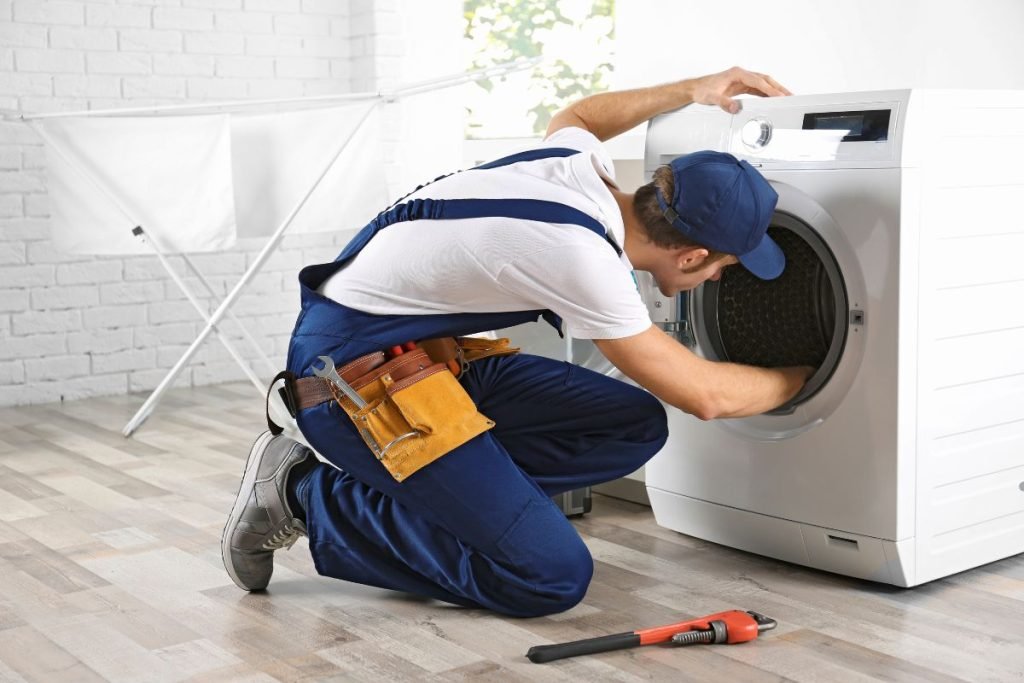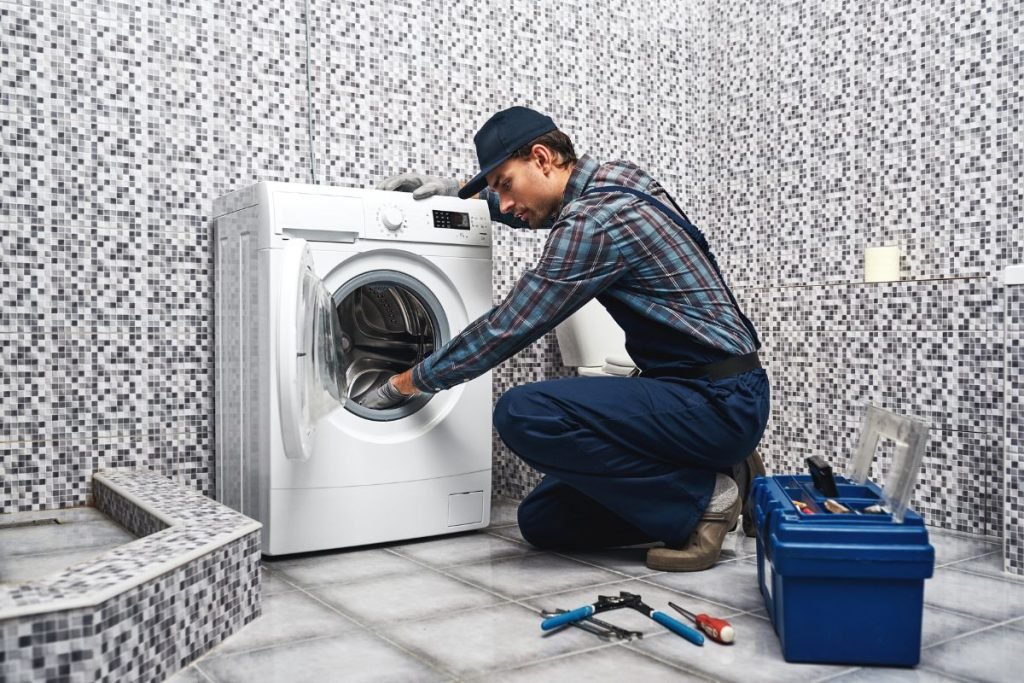
Figuring out who to call for home repairs can be confusing. Do you need an appliance tech or a plumber? Knowing the difference between the two can save you time, money, and a lot of frustration. This guide will help you decide who to contact for specific issues and what to expect during the repair process.
Key Takeaways
- Appliance techs handle issues with household machines like refrigerators, washers, and ovens.
- Plumbers focus on water systems, pipes, and fixtures like sinks and toilets.
- Some problems, like a leaking dishwasher, might require both an appliance tech and a plumber.
- Repair costs can vary widely depending on the issue and the professional you hire.
- Always check reviews, credentials, and ask questions before hiring someone.
Understanding the Roles of Appliance Techs and Plumbers
What Does an Appliance Tech Do?
An appliance tech focuses on repairing and maintaining household machines like refrigerators, washing machines, and ovens. They’re the go-to professionals when your dryer stops heating or your dishwasher starts leaking. Their expertise lies in diagnosing and fixing mechanical, electrical, or software-related issues specific to appliances. For more specialized services, check out our Heating and air conditioning services.
Key tasks they handle include:
- Replacing faulty parts, such as motors or sensors.
- Troubleshooting error codes on modern appliances.
- Performing routine maintenance to extend appliance life.
Key Responsibilities of a Plumber
Plumbers, on the other hand, deal with your home’s water systems. They handle everything from installing pipes to fixing leaks. If water is involved—whether it’s flowing, dripping, or completely stuck—a plumber is the one to call. Plumbing systems are their specialty.
Some of their primary responsibilities include:
- Repairing or replacing broken pipes and fixtures.
- Clearing clogged drains and sewer lines.
- Installing water heaters, toilets, and sinks.
For example, plumbers use advanced tools like hydro jets to clear stubborn blockages and ensure smooth water flow.

How Their Expertise Differs
While there’s some overlap, the difference boils down to what they work on. Appliance techs focus on devices powered by electricity or gas, while plumbers stick to water-related systems. Here’s a quick comparison:
| Appliance Techs | Plumbers |
| Fix washers, dryers, and stoves | Repair pipes, faucets, and drains |
| Handle electrical components | Work with water systems |
| Diagnose software issues | Install plumbing systems |
Knowing who to call can save you time and money. If your fridge isn’t cooling, don’t call a plumber. And if your sink is leaking, skip the appliance tech.
Common Household Issues and Who to Call
When to Call an Appliance Tech
If your fridge isn’t cooling or your dishwasher refuses to start, it’s time to think about an appliance tech. These experts handle problems related to the electrical and mechanical workings of household appliances. They’re your go-to for issues like broken washing machine belts or malfunctioning oven controls.
Here’s a quick list of when you should call an appliance tech:
- The appliance won’t power on despite being plugged in.
- Unusual noises or vibrations during operation.
- Performance issues, like uneven cooking or incomplete washing cycles.
If you’re unsure, many services even offer appliance repair scheduling to make the process easier.
Plumbing Problems That Require a Specialist
Plumbing issues often involve water flow, pipes, and drainage. A plumber is your best bet for problems like leaky faucets, clogged drains, or low water pressure. Pipes are their domain, and they have the tools to fix them properly.
Common situations that call for a plumber:
- Water pooling under sinks or around fixtures.
- Persistent drain clogs that won’t clear with basic methods.
- A sudden drop in water pressure throughout the house.
Gray Areas Between Appliance and Plumbing Repairs
Sometimes, the problem isn’t so clear-cut. For instance, a leaking dishwasher could mean a plumbing issue, or it could be an appliance malfunction. In these cases, start by identifying the source of the problem.
- If the issue is with the water supply line or drainage, a plumber is likely needed.
- If the appliance itself isn’t functioning, call an appliance tech.
If you’re stuck, some companies offer assessments to help you figure out who to call first. It’s all about pinpointing the root cause before diving into repairs.
Evaluating the Cost of Repairs
Cost Differences Between Appliance Techs and Plumbers
When it comes to home repairs, the cost can vary widely depending on whether you call an appliance tech or a plumber. Appliance repair costs typically range from $108 to $250, as noted by industry averages. This price often depends on factors like the extent of the damage or the cost of replacement parts. On the other hand, plumbers usually charge by the hour, with rates ranging from $45 to $200 per hour, depending on their experience and location. Keep in mind that plumbing jobs might also involve additional material costs, especially for pipe replacements or fittings. For professional help with larger-scale equipment, check out our commercial repair services.
Factors That Influence Repair Costs
Several things can affect how much you pay for repairs:
- Type of Issue: Simple fixes like unclogging a drain are cheaper than replacing a water heater or fixing a refrigerator compressor.
- Location: Repair costs can be higher in urban areas compared to rural ones.
- Emergency Services: Calling someone on a weekend or holiday could easily double the price.
Getting Accurate Repair Estimates
If you want to avoid surprises, getting a detailed estimate is key. Here’s how to make sure it’s accurate:
- Describe the Problem Clearly: Whether it’s a leaky pipe or a broken dryer, give as much detail as possible.
- Ask for a Breakdown: Make sure the estimate includes labor, parts, and any additional fees.
- Get Multiple Quotes: Comparing prices from a few professionals can help you gauge what’s reasonable.
Knowing what impacts repair costs can save you from overpaying. Whether it’s an appliance tech or a plumber, understanding their pricing structure gives you more control over your budget.
How to Choose the Right Professional for Your Needs
Questions to Ask Before Hiring
Before hiring anyone, it’s smart to ask a few key questions. Start with the basics: Are you licensed and insured? This can save you from potential headaches if something goes wrong. Then, ask about their experience. For example, how many years have they been doing this type of work? Finally, don’t hesitate to ask for references. A solid professional should have no problem providing a few names of past clients who can vouch for them.
Checking Credentials and Certifications
It’s one thing to say you’re qualified, but proof is another. Look for certifications that back up their skills. For instance, plumbers might have state-level licenses, and appliance techs could hold manufacturer-specific certifications. These credentials show they’ve had proper training. Also, check if they’re part of any professional organizations, which can be a good sign they take their work seriously.
Reading Reviews and Testimonials
Online reviews can be your best friend—or your worst enemy—when picking a professional. Look for patterns in the feedback. If multiple people mention poor communication or missed deadlines, that’s a red flag. On the flip side, consistent praise for quality work and reliability can give you peace of mind. Don’t forget to read a mix of positive and negative reviews to get the full picture.
Pro Tip: A qualified handyman can help maintain your property and might even help you avoid future insurance claims. It’s worth taking time to evaluate their experience and references. Learn more.
Preventative Maintenance Tips for Homeowners
Extending the Life of Your Appliances
Taking care of your appliances doesn’t have to be complicated. Start with small, consistent habits to keep them running smoothly. Regular cleaning is key—dust and debris can clog vents or filters, causing appliances to overheat or work inefficiently. For example:
- Clean refrigerator coils at least twice a year to improve energy efficiency.
- Run an empty dishwasher with vinegar once a month to clear out buildup.
- Check and replace washing machine hoses every few years to avoid leaks.
A little effort now can save you from costly repairs later.
Preventing Common Plumbing Issues
Plumbing problems can sneak up on you, but many are avoidable with some basic maintenance. Here are a few tips to keep your plumbing in good shape:
- Inspect under sinks and around toilets for signs of leaks.
- Avoid pouring grease or food scraps down the drain to prevent clogs.
- Flush your water heater annually to remove sediment buildup.
These steps can help you avoid emergencies and keep your water systems working properly.
When to Schedule Routine Inspections
Even if everything seems fine, scheduling routine inspections can catch issues before they become major headaches. Consider these timelines:
| Inspection Type | Frequency |
| HVAC System | Once a year |
| Plumbing | Every 2-3 years |
| Major Appliances | Annually |
Proactive maintenance is like a seasonal home maintenance checklist—it keeps your house running smoothly year-round.

Emergency Repairs: Who to Call First?
Identifying the Source of the Problem
When something goes wrong at home—like water pooling on the floor or an appliance that suddenly shuts down—it’s easy to panic. The first step? Stay calm and figure out where the issue is coming from. Is it a leaky pipe under the sink? Or maybe your washing machine is overflowing? Pinpointing the source of the problem is key to deciding who to call. If water is involved but it’s coming from an appliance, you’ll likely need an appliance tech. If it’s clearly a pipe issue, a plumber is your best bet.
Quick Fixes Before the Professionals Arrive
Sometimes, you can take small steps to minimize damage while waiting for help. Here are a few things you can do:
- Turn off the water supply. If water is leaking, locate the shut-off valve to stop the flow.
- Unplug faulty appliances. For safety, disconnect any malfunctioning appliance from its power source.
- Contain the damage. Use towels, buckets, or pans to manage leaks temporarily.
These actions won’t solve the issue, but they can buy you some time and prevent things from getting worse.
Why Timing Matters in Emergency Situations
Delaying a repair can turn a small issue into a big, expensive one. For instance, a minor water leak might lead to mold growth if not addressed quickly. Similarly, an appliance that’s sparking could pose a fire risk. Always act promptly to avoid these complications. If you’re unsure whether to call a plumber or an appliance tech, it’s better to err on the side of caution and get professional help.
Emergencies don’t wait, so knowing the right steps to take can save you both time and money. Acting quickly and wisely makes all the difference. Call now for immediate assistance
The Importance of Specialized Tools and Training
Tools Unique to Appliance Techs
Appliance technicians rely on a range of tools that are tailored to diagnosing and fixing home appliances. These include:
- Multimeters: Used to test electrical circuits and components.
- Vacuum pumps: Essential for repairing refrigeration systems.
- Specialty screwdrivers and nut drivers: Designed for accessing tight spaces in appliances like washing machines or ovens.
Without these tools, even a small appliance repair can become a huge hassle. It’s not just about having the tools, though—it’s knowing how to use them effectively. Check out our small appliance repair services for professional help
Plumbing Equipment That Makes a Difference
Plumbers, on the other hand, have their own arsenal of equipment. Some of the most common tools include:
- Pipe wrenches: For gripping and turning pipes.
- Drain snakes or augers: To clear clogs in drains and sewer lines.
- Plumbing torches: Used for soldering copper pipes.
These tools are designed to handle the unique challenges of plumbing systems, which often involve water pressure, corrosion, and tight spaces.
Why Expertise Matters in Complex Repairs
When it comes to complicated repairs, the right tools are only half the equation. Proper training ensures that professionals can diagnose problems quickly and fix them safely. For example, an appliance tech needs to understand how to safely handle electrical components, while a plumber must know how to prevent leaks when working with pressurized water systems.
Hiring someone with the right tools and training isn’t just about getting the job done—it’s about getting it done right the first time, saving you time and money in the long run.
Wrapping It Up
At the end of the day, picking between an appliance tech and a plumber really comes down to what’s broken and who’s best equipped to fix it. If it’s something like a leaky faucet or a clogged drain, a plumber’s your go-to. But if your washing machine’s acting up or your fridge isn’t cooling, an appliance tech is probably the right call. It’s all about knowing who handles what. And hey, if you’re ever unsure, just ask! Most professionals are happy to point you in the right direction. The goal is to get your home back in working order without the extra stress.
Frequently Asked Questions
What’s the difference between an appliance tech and a plumber?
An appliance tech fixes things like dishwashers, washing machines, and ovens. A plumber works on water pipes, drains, and fixtures like sinks and toilets. Contact us for professional help with your repairs
How do I know if I need an appliance tech or a plumber?
If the issue is with a home appliance, call an appliance tech. If it’s about water flow, leaks, or drains, a plumber is your best bet.
Are appliance techs and plumbers equally expensive?
It depends on the job. Some appliance repairs might cost less, but plumbing issues, especially big ones, can get pricey.
What should I ask before hiring someone to fix my problem?
Ask about their experience, certifications, and if they’ve handled issues like yours before. Also, get a cost estimate.
Can I fix simple problems myself?
For small issues, like unclogging a drain or resetting an appliance, you can try. But for bigger problems, it’s safer to call a pro.
Why is regular maintenance important?
It helps avoid big problems later. Simple checks can keep your appliances and plumbing working longer and save you money. Call us for expert advice and service
